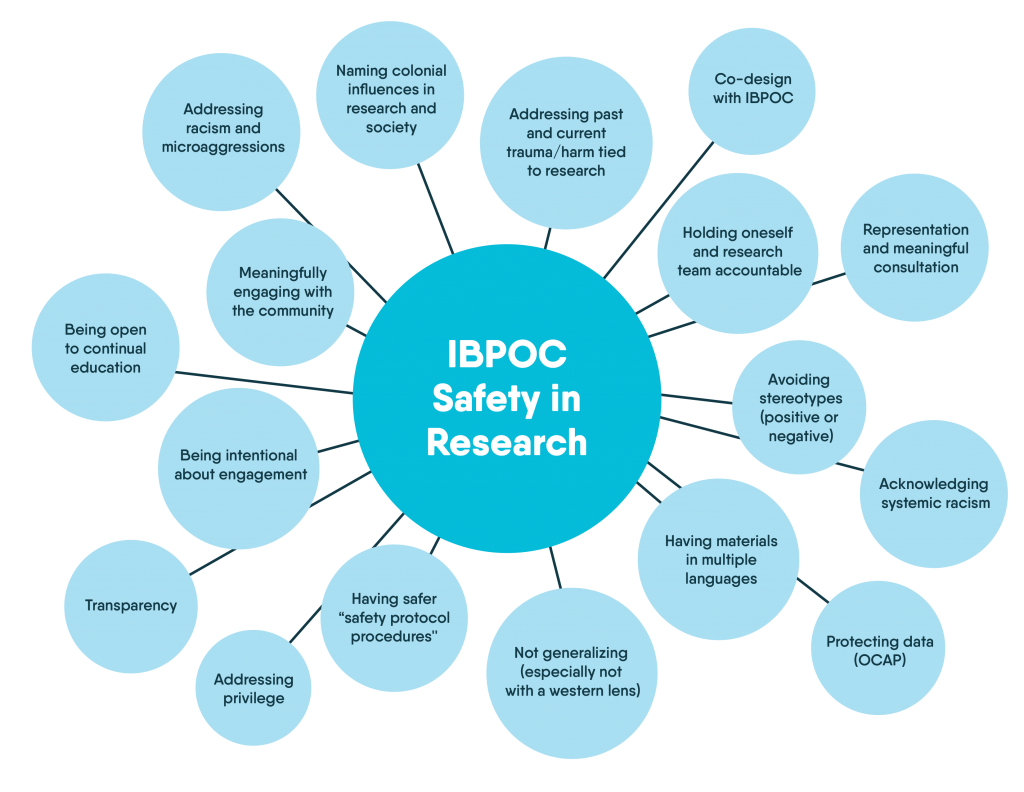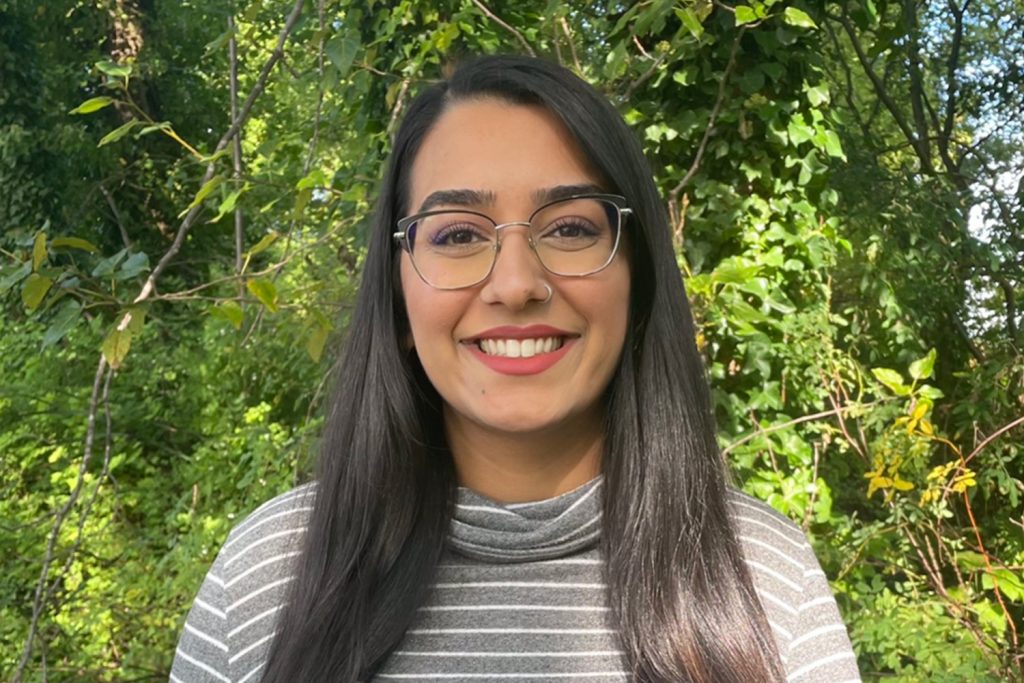Written by: Gurvaan Mann, Youth Research Assistant
When discussing how to safely engage with Indigenous, Black, and People of Colour (IBPOC) in research, I want to begin by highlighting the importance of acknowledging the history and current impacts of the trauma/harm related to research with racialized individuals.
For a long period of time, and even currently, research has been incredibly harmful for racialized individuals. For instance, white and western researchers would often engage with racialized communities through a western lens to meet their own agenda.
Similarly, those same researchers would collect data from racialized communities, especially Indigenous communities, in order to weaponize it against Indigenous communities, to further harm those communities. Without Indigenous people having ownership of their data, the data could easily be manipulated or falsely represented to harm their communities.

Photo by Christina from Unsplash | Image Description: Two racialized individuals staring at a third person,
while partially smiling. One of the two individuals has a grey laptop in front of them.
Although there are now specific practices in place that aim to ensure more safety for how Indigenous data are kept, data are often not maintained based on those principles, and research is overall still very unsafe for racialized individuals.
In exploring the topic of trying to create more safety in research for racialized individuals, I want to state that there is no one exact way that safety can be ensured in all spaces. However, it’s important to consult and aim to co-create with racialized individuals and communities.
On a broader level, the following points can help foster more safety for racialized individuals in research:
Intentionality
An incredibly critical factor in facilitating more safety for IBPOC folks in research is working with intentionality; this includes thinking about the safety and inclusion of IBPOC folks in the beginning and planning stages of research studies. The engagement of IBPOC folks and communities should be done meaningfully, and it should never be an afterthought. Intentionality is also connected to educating oneself about specific racialized communities and learning about cultural practices.
Education
Education involves learning more about the specific racialized communities researchers are planning on engaging with. Through learning more about the communities, it allows for more authentic engagement, and racialized individuals have less work to do on their end in educating others how to make research spaces safer.
Additionally, education includes not only the researchers educating themselves on the cultures and communities, but also learning about systemic racism and injustices, especially in relation to research.
Education also includes researchers learning about the racialized communities they’re working with and continuing to learn, even once the information may no longer pertain to the research itself.
Lastly, this includes learning and naming one’s privileges and positionality.
Accountability
Accountability includes holding others and oneself responsible, specifically if there is someone actively being racist, whether that is overtly or more covertly (such as microaggressions). Accountability can be done in a gentle and educational way. When correcting others and holding them accountable, it’s important to be mindful of not consistently placing the emotional labour on other IBPOC individuals to educate others.
Additionally, accountability includes being open to having others hold oneself responsible, and not being defensive or projecting one’s guilt onto racialized individuals for holding people accountable.

Photo by Christina from Unsplash | Image Description: A black and another racialized individual stare at a computer screen.
Both seem to be in an office setting.
Safety Protocols
Safety protocols often do not account for systemic racism, which are the many systems that operate within society that are unsafe for many racialized individuals and instead inflict harm upon them.
Many of the systems are even more unsafe for some races that face a disproportionate amount of harm compared to other racialized communities, such as Indigenous and Black folks.
Ways in which systemic racism can be taken into account in research are by recognizing how many of the colonial systems that govern society are incredibly harmful for many racialized individuals. After gaining more education on systemic racism and injustices, it can be incredibly helpful to keep those learnings in mind when trying to improve safety procedures for IBPOC folks. For instance, when someone is in crisis, the immediate response is contacting emergency services to get a wellness check.
However, wellness checks have often led to racialized individuals facing police brutality, and in some cases lead to death. In this instance, incorporating extra steps before escalating to emergency services is helpful, such as having a supportive person available to speak with those needing additional support.
Another example of how safety protocol measures can create more safety is in how the data are collected and stored. For instance, Indigenous data are meant to follow the Ownership, Control, Access, and Possession (OCAP) principles. However, they are not often held to those standards. By following OCAP principles, it can allow for more safety when engaging with Indigenous folks in research.
 Image Description: A blue system’s web with “IBPOC Safety in Research” written in white text in the centre, with sixteen smaller blue circles including methods of creating more safety branching out of the central theme. The system’s web is against a white background. The sixteen items include: avoiding stereotypes (positive or negative), acknowledging systemic racism, having materials in multiple languages, not generalizing (especially not with a western lens), having safer “safety protocol procedures”, addressing privilege, transparency, being intentional about engagement, being open to continual education, addressing racism and microaggressions, meaningfully engaging with the community, naming colonial influences in research and society, co-design with IBPOC, addressing past and current trauma/harm tied to research, holding oneself and research team accountable, representation and meaningful consultation, and protecting data (OCAP).
Image Description: A blue system’s web with “IBPOC Safety in Research” written in white text in the centre, with sixteen smaller blue circles including methods of creating more safety branching out of the central theme. The system’s web is against a white background. The sixteen items include: avoiding stereotypes (positive or negative), acknowledging systemic racism, having materials in multiple languages, not generalizing (especially not with a western lens), having safer “safety protocol procedures”, addressing privilege, transparency, being intentional about engagement, being open to continual education, addressing racism and microaggressions, meaningfully engaging with the community, naming colonial influences in research and society, co-design with IBPOC, addressing past and current trauma/harm tied to research, holding oneself and research team accountable, representation and meaningful consultation, and protecting data (OCAP).
About Gurvaan Mann:

Image Description: A racialized person smiling at the camera, surrounded by a background of greenery.
Gurvaan holds a BA in psychology and minor in Asian area studies. She has been involved in various research positions at Foundry and UBC. She has been a member of youth research advisory panels, directly engaging with researchers and other youth, along with conducting research alongside a team. As a youth research assistant, Gurvaan has able to facilitate greater engagement of marginalized youth, with lived experience of mental health struggles and substance use, by establishing greater safety and accessibility for them. She is incredibly passionate about using intersectionality to increase the safety of marginalized communities in research and in her support roles.
Keywords: IBPOC, Safe Space, Research, Research Study, Foundry, Gurvaan Mann, Youth, Youth Research, Racialized, Indigenous, Community, Data, Intentionality, Education, Accountability, Safety, Protocol, Engagement, Intersectionality, Accessibility, Support, Foundry BC